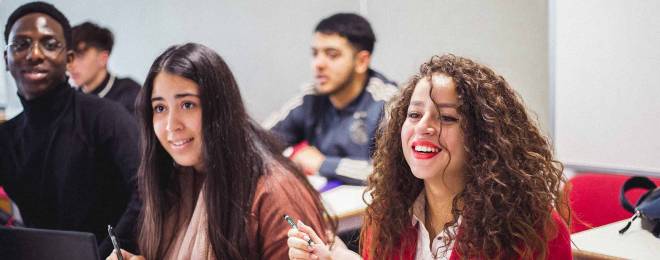
Excelia’s triple-accredited Master in Management continues to rise in all the major rankings, including the Financial Times, L’Étudiant, Le Figaro and Challenges. An outstanding achievement, the result of innovative pedagogy that continues to prove its worth.
As Head of the Master in Management, Caroline Hermet explains that “the objective of our programme is to educate students to become responsible managers, capable of operating in constantly changing environments that are becoming increasingly complex”.
To achieve this objective, the Master in Management places ‘the human element and experiences at the heart of its pedagogy’, combined with a solid foundation in the fundamentals. An intelligent blend of academic knowledge and hands-on experience, the strength of the programme lies in the continuous interplay between the School and the different environments that surround us. For Caroline Hermet, such experiences therefore need to be “extremely varied, both in terms of the actual environment in which they are carried out, and in terms of what they involve”.
HUMACITÉ©: AN EXPERIENCE FOCUSSING ON HELPING OTHERS
 Now in its 15th year, and with 6,000 projects already undertaken, Excelia’s flagship initiative, Humacité©, perfectly illustrates the School’s desire to place experiences at the heart of its teaching. Humacité© offers students the opportunity to enjoy a unique and rewarding learning experience by undertaking a humanitarian and civic project of 6-12 weeks.
Now in its 15th year, and with 6,000 projects already undertaken, Excelia’s flagship initiative, Humacité©, perfectly illustrates the School’s desire to place experiences at the heart of its teaching. Humacité© offers students the opportunity to enjoy a unique and rewarding learning experience by undertaking a humanitarian and civic project of 6-12 weeks.
With an extensive range of projects that can be carried out in France and abroad students can choose to support people with disabilities, work with children and the youth, promote local development projects, etc.
Edouard, a Year 3 student, chose to carry out his Humacité© project in Bangkok, Thailand.
Working for the association ‘Good Shepherd Sisters’, he was involved in helping immigrant and underprivileged children awaiting naturalisation. For Edouard, this experience was enriching on all levels… on a human level, on a professional level, as well as on a cultural level. Not only did this experience change the way he sees the world, but it also gave him the opportunity to develop new skills:
For Sophie Pauget, Head of Humacité© and Climacité©, this compulsory project in Year 1 of the programme is not only an excellent way of learning about others and discovering different cultures, but is also an opportunity to develop social skills and other valuable competencies.
Students have to develop a whole range of soft skills… the ability to interact and listen, to work in a team with other volunteers, to adapt to an environment that may be difficult or harsh, etc. Through their Humacité© project, students mature immeasurably: “Students will have to give a lot of themselves, however, they will receive a lot in return… they undergo a transformation!”
As Sophie Pauget points out that "this project has to have meaning in order for it to be as enriching as possible”. To help with this, in Semester 2, students take a course in Sustainable Development with a view to preparing them for the experience they are about to embark on and to understand international issues, such as children at risk, global famine, etc. This course helps students to give substance to their projects.
Following their project, students have to submit a report about their experiences, which will attest to the skills they have acquired. In addition, they will receive support in understanding how to best ‘promote’ these experiences to recruiters. They need to know how to talk about their project in order to really capitalise on it.
CLIMACITÉ©: AN EXPERIENCE FOCUSSING ON ENVIRONMENTAL ISSUES
 Launched in September 2020, this latest initiative is aimed at Year 2 students. Designed along the same lines as Humacité©, Sophie Pauget explains that “this unique experience aims to encourage students to become environmentally minded”.
Launched in September 2020, this latest initiative is aimed at Year 2 students. Designed along the same lines as Humacité©, Sophie Pauget explains that “this unique experience aims to encourage students to become environmentally minded”.
In the world we live in, climate change has become a major issue not only affecting the professions of today, but also those of the future, making this experience invaluable. Although the issues surrounding global warming may be a source of anxiety, Sophie Pauget emphasises that “we want to address them in a positive way by going out into the field to observe initiatives that are actually working. We need to prove to students that as individuals, and as future entrepreneurs or managers, they have a role to play and can positively contribute”.
Associate Professor in Strategy and Corporate Social Responsibility, Dimbi Ramonjy teaches an important module to Year 1 students, designed to raise their awareness of, and prepare them for, the challenges of sustainable development and energy transition.
This module aims to give meaning to the Climacité© initiative:
As with Humacité©, Sophie Pauget highlights that Climacité© can take different forms, “from working in a company, in an environmental association, or even in a local authority that has adopted a zero-carbon territory project... the possibilities are manifold”.
EXPERIENCES ABROAD: A JOURNEY OF SELF-DISCOVERY
 In addition to Humacité© and Climacité© projects which can be undertaken outside of France, students can also head abroad for internships and academic expatriation. Whether they decide to spend a semester or an entire academic year in the United States, China or any of Excelia’s other partner universities, their academic expatriation will not only be an unforgettable experience but also an opportunity for self-discovery.
In addition to Humacité© and Climacité© projects which can be undertaken outside of France, students can also head abroad for internships and academic expatriation. Whether they decide to spend a semester or an entire academic year in the United States, China or any of Excelia’s other partner universities, their academic expatriation will not only be an unforgettable experience but also an opportunity for self-discovery.
As Head of International Relations for the Master in Management, Camille Berge highlights the importance of university exchanges abroad for personal development:
For Camille Berge, choosing academic expatriation means having the opportunity to change your entire life for a semester or a year. However, embarking on a new life, and facing the unknown, is not an easy thing to do. “Sometimes, adapting requires a lot of effort, but the more effort students put in, the more they will develop as a person”, she explains.
After his Humacité© project in Thailand, Edouard then spent a semester in Taiwan at Feng Chia University:
Although expatriation certainly contributes to personal fulfilment, Camille Berge adds that “it is also a great asset on your CV, proving to future employers that you have acquired valuable skills such as autonomy, curiosity, adaptability, and a taste for new challenges”. As a way of helping them to stand out from the crowd, she recommends that students try to find a destination that is a little out of the ordinary, which will not only prove their uniqueness during a job interview but also arouse the curiosity of recruiters.
WORK-STUDY: REAL EXPERIENCE IN THE BUSINESS WORLD
 With 500 MiM students currently on a work-study track, it’s clear that of all the different forms of experiential learning work-study plays a pivotal role. Open to all students, this professional experience can be carried out over 12 or 24 months, working in a company or a government body.
With 500 MiM students currently on a work-study track, it’s clear that of all the different forms of experiential learning work-study plays a pivotal role. Open to all students, this professional experience can be carried out over 12 or 24 months, working in a company or a government body.
For Séverine Grangereau, Head of Excelia’s Apprenticeship Training Centre, work-study offers students :
Whilst the principal feature of work-study is alternating company-based periods with School-based periods, Séverine Grangereau believes that work-study constitutes a veritable accelerator of maturity. It requires the ability to organise oneself on both an intellectual and logistical level as well as a certain maturity on both a personal and professional level since students have to manage the many challenges set by their employer in parallel with the demands of their academic studies. Juggling the two means that students have to adapt very quickly.
Emilie chose to carry out her final year of the MiM programme on a work-study track:
All these different experiences are enriching and rewarding, and they all have a common goal… to enhance the employability of our students. By carefully blending academic studies with hands-on experience, the MiM offers students all the keys for success both in their professional life and in their personal life.





